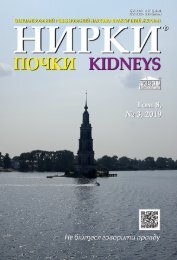Create successful ePaper yourself
Turn your PDF publications into a flip-book with our unique Google optimized e-Paper software.
Òåìà íîìåðó
Cover Story
UDC 612.1/.8-616.61-002.27 DOI: 10.22141/2307-1257.9.1.2020.196911
Dmytro Ivanov, Mariia Ivanova
1
Shupyk National Medical Academy of Postgraduate Education, Kyiv, Ukraine
2
Universita di Milano-Bicocca, Milan, Italy
Hydration: the review of 3 trials
Abstract. The concepts of forced hydration and excessive forced hydration are discussed in the article.
The authors emphasize that excessive forced hydration has a proven track record in impr oving the quality
of life for dehydrated people. In case of normovolemia, there is no evidence of quality improvement
and prolongation of life when excessive forced hydration is used. The issue of forced hydration in chronic
kidney disease (CKD) is considered separately. Three randomized clinical trials were analyzed in which patients
with CKD stage 1–2, 3 and 4–5 received forced hydration. The results of studies indicate the possible
efficacy of forced hydration in stage 1–2 CKD in patients with normal or increased renal functional reserve.
In stage 3 CKD, forced hydration showed no benefits, and in stage 4–5 CKD, it resulted in greater renal
function loss. Summarizing these data, the authors concluded that it is probably appropriate for healthy
people to consume the amount of fluid that provides physiological diuresis of 1.2–1.8 L and normal urine
osmolarity. Forced hydration is often excessive, excessive forced hydration may not promote a healthy
lifestyle. Forced hydration becomes excessive forced hydration as kidney function decreases. Possibly, the
benefits of forced hydration are lost in CKD with progression of renal function loss. The effect of forced hydration
for 12 months may be positive in stage 1 CKD and stage 2 CKD with normal renal functional reserve.
Forced hydration is probably inexpedient in chronic stages 3–5.
Keywords: hydration; excessive hydration; excessive forced hydration; chronic kidney disease and hydration;
renal functional reserve
Nowadays, the issue of coaching to increase water intake
(CIWI) is regarded as one of the elements of healthy
lifestyle. Coaching to increase water intake was promoted
by the formula of water amount for human intake: body
weight 30 1.5. For example, in a body weight of 60 kg:
60 30 1.5 = 2.700 mL. However, European Food Safety
Authority (EFSA) recommends daily water intake of 1.6 L
for women or 2.0 L for men and 2.000 mL (water and liquid)
for women and 2.500 mL (water and liquid) for men living in
a temperate climate and having normal physical activity [1].
Therefore, a certain controversy exists between coaching to
increase water intake and excessive water intake.
International Society of Nephrology together with Danone
has started the hydration initiative — ISN Hydration
For Kidney Health Research [2]. For 10 years, hydration
science has been actively used to make recommendations
for water intake schedule [3]. Hydration For Health has
provided several publications on hydration. Khan et al. were
the first to show that increased water intake up to 2.5 L/day
during 4 days significantly improves cognitive flexibility
compared with low water intake (0.5 L/day) in children [4].
EFSA recommends that breastfeeding women should increase
the amount of water for about 700 mL/day, i.e. appropriate
intake is 2.700 mL/day (with food and drinks) or
about 2.200 mL/day with drinks [5]. Hydration Calculator
developed by Hydration for Health is available at https://
www.hydrationforhealth.com/en/hydration-tools/hydration-calculator/.
Almost all information of this entity is
aimed at CIWI. However, it is important to distinguish water
intake and liquid intake (water + liquid); high intake volumes
refer directly to water and liquid from food.
Finally, excessive hydration has no definitive data in
terms of its compliance, efficacy for increased life expectancy
or improved quality of life. Certainly, hydration is
beneficial in case of liquid deficiency that is commonly important
for elderly people and athletes. Excessive hydration
© «Нирки» / «Почки» / «Kidneys» ( ), 2020
© Видавець Заславський О.Ю. / Издатель Заславский А.Ю. / Publisher Zaslavsky O.Yu., 2020
Для кореспонденції: Іванов Дмитро Дмитрович, доктор медичних наук, професор, завідувач кафедри нефрології і нирково-замісної терапії, Національна медична академія післядипломної
освіти імені П.Л. Шупика, вул. Дорогожицька, 9, м. Київ, 04112, Україна; e-mail: drivanovdd@gmail.com
For correspondence: Dmytro D. Ivanov, MD, PhD, Professor, Head of the Department of nephrology and renal replacement therapy, Shupyk National Medical Academy of Postgraduate Education,
Dorohozhytska st., 9, Kyiv, 04112, Ukraine; e-mail: drivanovdd@gmail.com
Full list of author information is available at the end of the article.
Òîì 9, ¹ 1, 2020
www.mif-ua.com, http://kidneys.zaslavsky.com.ua 21














